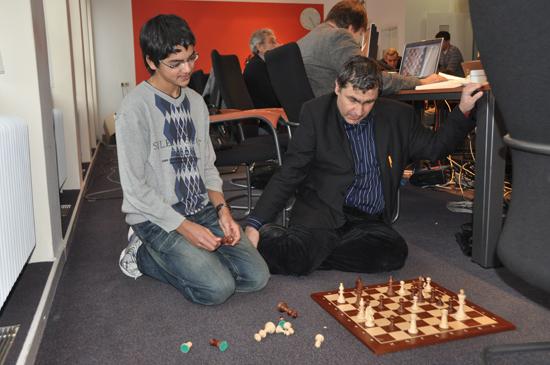
My games from DHLC Slow Swiss #9 - Puzzles and analysis
A lot of wise people (including Botvinnik) said that, in order to progress, the chess player has to, among other things: 1. analyse his own games; 2. publish the analysis. So, here’s my first attempt at that. (Actually, the second attempt; I already wrote more than a half of this blog post when, because of some chess.com glitch and my ineptitude, all of my work was gone. Since my obscene language and oaths of vengeance didn’t bring my content back, I had to start all over. Hopefully, this time everything will be fine.)
I’ll be analysing my five games from DHLC Slow-Swiss #9, played here at chess.com, with the time controls of 45 minutes per game + 45 seconds of increment per move. My play in this tournament wasn’t really stellar, as I won two and lost three games to a lower rated opposition. Looking at it from the bright side, it is said that the analysis of your losses can be more useful, because you can spot and eliminate your errors.
For those of you who don’t really care about the analysis, you can try to solve the puzzles from the games. Or, if you are really enthusiastic, you can first look at the puzzles, and then the full games. :)
I was using the chess software to help me with the analysis. It would probably be more beneficial to first try to figure all out by myself, but that would require much more of my time, which sometimes I don’t have. You would probably see this post in about three years then. :)
Okay, let’s start with the puzzles. The first one is from my first game. White has just played his knight from e4 to d6. Looks like a great outpost, but black has something else in mind.
Those were the puzzles. Now, the hard part.
In my first game, I went for an aggressive move too early, in a position which required quieter positional play. I underestimated my opponent's defensive capabilities and was rightfully punished for that - my weak threats were defused and I found myself in a slightly worse position, which, after a tactical oversight, turned into a losing position.
Now, let's look at the positive and negative sides of my play. Well, negatives are more obvious:
1. I underestimated my opponent, which is a mistake I believe I'll be able to avoid in the future - so it's a good lesson.
2. I was impatient and made a empty (and commital) threat in a position that required a positional approach. This is related to the first point, but it's also a mistake by itself which might be a bit harder to correct.
3. I missed a crucial tactical shot. Guess I need more Tactics Trainer.
Positives? Well, I guess I learned that in this variation of QGD there's not much room for kingside attack. Ideas such as using the central pawn majority or the minority attack on the queenside are better suited. Those seem like a bit more advanced strategies, though.
Also, a good part of credit for my defeat should go to my opponent. He played the opening well, then, despite some inaccuracies, made moves that gave me a lot of trouble, and finally, ended the game with a nice tactical shot. Good for him!
In the second game, my opponent played a Sicilian sideline that he seems to play often. Despite that, I had a good position out of the opening, but then, in a complicated middlegame, simply got outplayed.
I'm actually not too critical of my play in this game. The blunder I made happened because of fatigue and lack of concentration. The bigger problem is that I went aggressive before I fully completed my development, again. My opponent played well in the crucial part of the game and after that, converted his advantage quite confidently.
In my next game, I showed that I can play much worse. I played a terrible opening, and after that, it all went downhill.
My play here was really bad. It's not he problem that I forgot the theory, it happens, it's that I didn't seriously start checking for threats as soon as it happened. If I had, I wouldn't have lost the pawn. Secondly, I started with the desperate tricks too early. Instead, I should have tried to consolidate, play tenacious defence, let my opponent try to beat me without my help, and then counterattack if the chance appears.
On a positive side, it could hardly be worse. Plus, next time I'll surely know how what to play if I'm faced with this variation. :)
Tom played nicely, punished my mistakes, and was definitely a better player on that day. Well deserved victory for him.
When you reach the low point, you can move only upwards. I won the next two games. In the fourth, my play wasn't anything special, but still, a win was a good change.
My play here wasn't stellar, and I made several tactical errors. I was also displeased with my time management. Still, I had some nice ideas too (I liked my Qa5 and d4), and when you finally win after three losses, you shouldn't complain too much. :)
The fifth game was quite interesting, and I managed to win it, although I was again in the trouble during the middlegame. By blundering a pawn, my opponent helped me to finish this tournament on a high note.